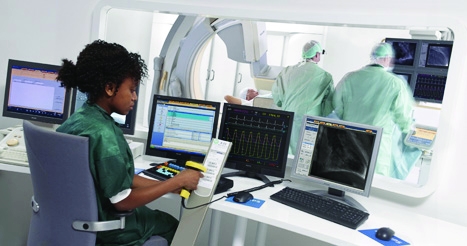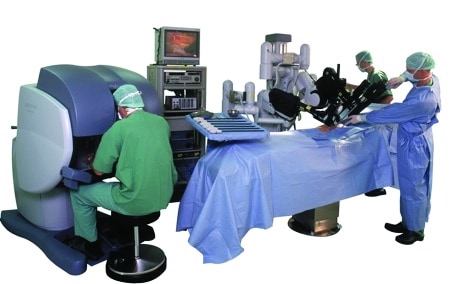 Engineers should be given the opportunity to help ease the burden on the UK's beleaguered health service writes Dr Helen Meese, Head of Healthcare at the Institution of Mechanical Engineers.
Engineers should be given the opportunity to help ease the burden on the UK's beleaguered health service writes Dr Helen Meese, Head of Healthcare at the Institution of Mechanical Engineers.
The financial struggles of the NHS have been dominating the headlines for many months now; inefficient services and overwhelmed hospitals are cited as the root causes. Yet with people living longer lives, a continually growing population and more advanced and increasingly expensive treatments becoming available, the £115bn cost of the NHS can only continue to rise.

I am often asked, “Why are engineers concerned about the NHS?” Well aside from all of us being patients at some point in our lives, the reason we are concerned is the largely hidden and undervalued contribution engineers make to our National Health Service every day. I am not simply referring to the 3000 UK SMEs; designing and manufacturing cutting edge healthcare devices and equipment, but the thousands of engineers within the NHS itself, working in areas such as prosthetics and orthopaedics, renal care, rehabilitation, imaging and modelling as well as tele-health and robotics.
While the debate on ‘pressures on front-line services’ rages on, the one area that has so far been overlooked is the role of technology. Technology and the biomedical engineers who develop, procure and maintain this technology, have the potential to not only ease the burden on services but also significantly cut costs.

The Institution recently carried out a member survey and of the 200 engineers who responded, 94% said that the UK should have a Chief Engineer, similar to a Chief Nurse or Chief Medical Officer, to oversee the use of medical equipment in every NHS Acute Trust. The majority (86%) think that giving engineers more responsibility for the procurement, maintenance and calibration of medical equipment would help the NHS meet the Government’s efficiency savings, while 80% said it would ensure NHS patients have a better experience when under hospital care. Perhaps surprisingly, nearly two thirds of those surveyed (65%) also said that engineers working in the NHS should have more hands-on involvement with front-line patient care.
Technical innovations are set to revolutionise healthcare in the coming decades.
The engineering community is clearly confident that it can make a difference, and giving engineers already working in hospitals more responsibility for medical equipment would be a step-change in our approach to medical care in the UK.
Technical innovations are set to revolutionise healthcare in the coming decades. Big data, will allow doctors to undertake predictive modelling and trending to pinpoint for example, outbreaks of disease linked to environmental conditions. The development of tele-health and smart phone apps which access body-worn measurement systems are also set to transform the way illnesses like diabetes and heart disease are controlled and monitored. While surgical robotic manipulators will become more prevalent allowing surgeons to navigate deep inside the body, avoiding the risks and complications of traditional open surgery.

Such innovations will allow even complex interventions to be treated as day cases. All of these technologies not only look set to improve patient care, but also help ease the burden on increasingly overworked clinical staff. In order to properly exploit these technologies however, we need engineers.
Lack of cooperation and coordination between expert NHS engineers is preventing huge cost savings and efficiencies
Biomedical engineers are already working in the NHS, providing a crucial role in the development, selection, use, maintenance and decommissioning of technologies. However, unlike many other NHS professions, there is little uniform recognition of the biomedical engineer. NHS biomedical engineers are often assigned to different departments, operate at different levels of authority and have varying input into critical decision-making, depending on which Trust they are employed at. This inconsistency not only undermines the work of engineers, but hampers connectivity between Trusts on the development, procurement, maintenance, and sharing of medical equipment.
At a time of financial constraints, this lack of cooperation and coordination between expert NHS engineers is preventing huge cost savings and efficiencies related to medical equipment, which could be made without affecting front-line services. It is estimated that including engineering into this process has the potential to save the NHS over £700m each year.
The Institution of Mechanical Engineers is leading a campaign to create a Chief Biomedical Engineer position in each acute NHS Trust, working alongside roles such as the chief nurse and chief pharmacist; with consistent qualifications, level of authority, decision-making abilities and connectivity with other Trusts. This would not only increase the opportunity for cost savings but also encourage best practice in the procurement, maintenance and use of medical equipment as well as inspire technological innovation.
In many Trusts, this position and role will already exist, albeit under different titles, departments and levels of authority. The costs of implementation would be negligible, but the benefits to patients, services, budgets and the NHS would be significant.




Report highlights significant impact of manufacturing on UK economy
I am not convinced that the High Value Manufacturing Centres do anything to improve the manufacturing processes - more to help produce products (using...